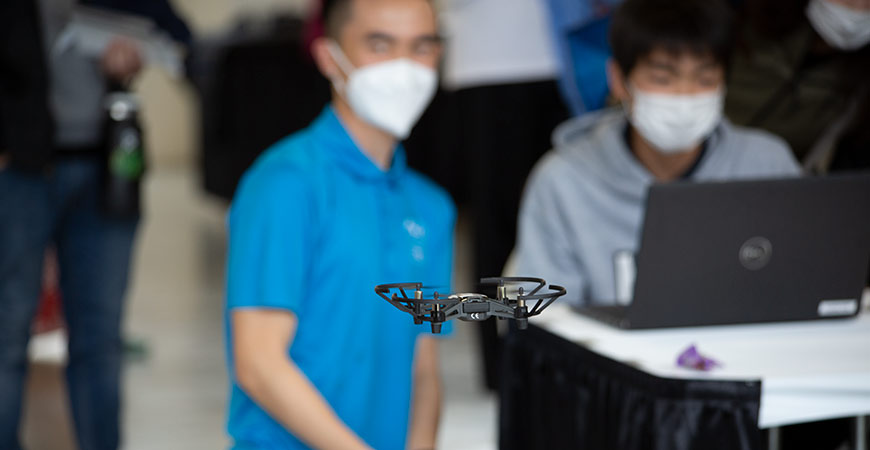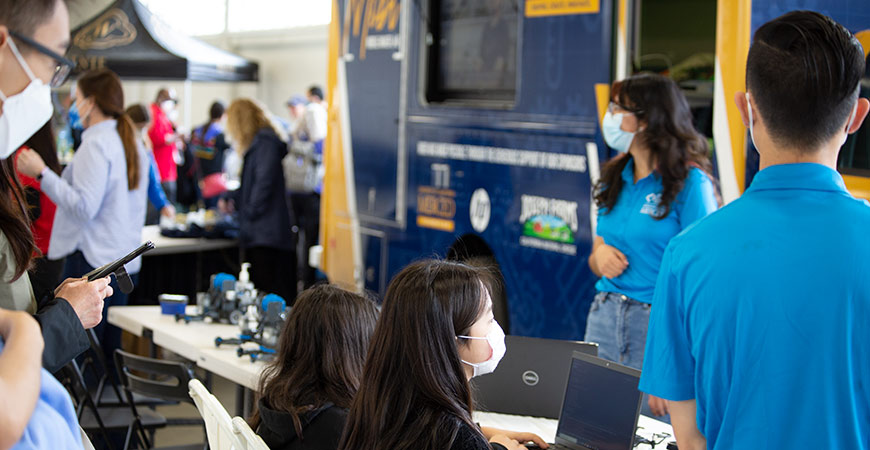
A team of UC Merced engineering students brought hands-on lessons on drones and robotics to hundreds of children and families at the recent Tri-Valley Innovation Fair.
“Drones and robots are a gateway, a spark for young people to explore STEM,” said Leigh Bernacchi, program director of the Center for Information Technology Research in the Interest of Society (CITRIS) and the Banatao Institute at UC Merced, who led the students in the all-day demonstrations at the March 19 fair.
“With UC Merced engineers teaching and mentoring, students see themselves in higher education,” she said. “Our new FLY CITRIS program shows that anyone can program a drone and that technology is fun and creative.”
“I believe a positive hands-on experience can prompt curiosity and excitement in a student,” said alumna Fatima Gamiño (’20) of Firebaugh, a CITRIS aviation junior specialist who provided lessons at the innovation fair.
With UC Merced’s Mobile Maker Lab as headquarters, the CITRIS team taught young people to write simple programs in introductory Python to make drones fly a pattern — a new curriculum unit developed by Gamiño and Peter Sou (’22) who will graduate in May with a computer science and engineering degree. At a second station the young people, from 1-25 years of age, maneuvered driving robots adorned with UC Merced pennants through a short course. The robots are routinely used to inspire middle schoolers in Merced about robotics and coding.

“The field of drones sparked my interest when I realized that I could combine innovative technology with my passion for environmental science,” Gamiño said. “With the help of drones, I get to participate in a novel way to capture data and apply it to local issues."
Lina B-Hernandez (’24), a mechanical engineering student from Madera, said teaching robotics to young people “has given me the opportunity to get out of my comfort zone and I have been able to reach new lengths to my own learning.”
“During the event, I got to interact with a younger audience, and I was able to see their excitement in learning about robots and coding. Since the pandemic, few students have been able to get hands-on experiences and this event helped with their transition back to hands-on learning,” she said.
Fellow mechanical engineering student Paul Conanan (’22), from the Bay Area, said he enjoys teaching as a way to “give back to my community.”
“What made this event special was the different kids that came and took time off their day to learn about robotics and drones,” he said of the Saturday event that filled five buildings with science displays for families and children.
“Adding on how COVID drastically affected a student's way of social interaction, this was an amazing opportunity for them to expand and learn more and have the chance to have some hands-on and in-person learning."
The fourth annual Innovation Fair, held at the Alameda County Fairgrounds in Pleasanton, is part of an ongoing effort to raise funds and awareness for the planned Quest Science Center. Quest CEO Monya Lane serves as vice chair on the board of the UC Merced Foundation, and Quest board member Jose Hernandez is a University of California regent.
Nearly 3,000 students and families registered to attend the fair in advance.
The Mobile Maker Lab — Mobi — was supported by the UC Merced Foundation Board of Trustees, Joseph Gallo Farms and HP to help faculty and students bring science lessons to area schools and community events. Faculty have begun programming school visits with Mobi, with planned lessons on robotics and marine biology.
Those interested in having faculty and students bring Mobi to their schools can email UC Merced Public Relations.



